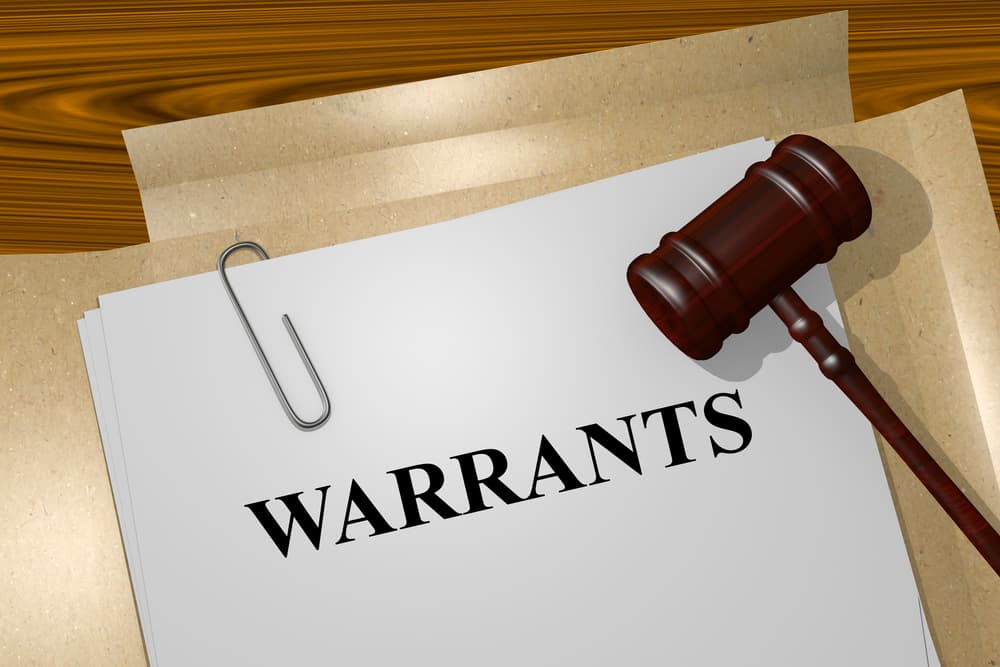Arrest warrants never expire, despite what many people think. A warrant issued today could lead to an arrest even decades later. Law enforcement has arrested people for warrants that were 30 or 40 years old. People with outstanding warrants live with “invisible handcuffs” that could close at any time.
The court’s arrest warrant stays active until something happens. The person must post bond, show up in court, or law enforcement must make an arrest. These warrants make life difficult. They limit your freedom to move around, particularly between states. This piece looks at warrant types and their validity periods. It also covers legal ways to resolve them. The relationship between warrants and statutes of limitations matters too. The text explains what it all means when someone ignores an active warrant. Anyone worried about bench warrants or search warrants should know these legal basics before they act.

Table of Contents
- 1 Types of Warrants and Their Purpose
- 2 Do Warrants Expire or Stay Active Forever?
- 3 Legal Tools to Clear or Quash a Warrant
- 4 How Statutes of Limitations Affect Warrants
- 5 Consequences of Ignoring an Active Warrant
- 6 Summing all up
- 7 Here are some FAQs about if can warrants expire:
- 7.1 Do warrants have an expiry date?
- 7.2 What is a warrant?
- 7.3 Do warrants expire worthless?
- 7.4 What happens if warrants are not exercised?
- 7.5 What does it mean when a warrant expires?
- 7.6 Are warrants perpetual?
- 7.7 What happens when warrants are called?
- 7.8 Do warrants expire in America?
- 7.9 Can I sell my warrants?
- 7.10 What is warrant expiry?
Types of Warrants and Their Purpose
The legal system uses different types of warrants to enforce court orders, break down crimes, and help judges retain control. Each warrant has its own purpose. These documents give law enforcement specific powers while protecting citizens’ rights.
Arrest warrants
Law enforcement needs arrest warrants to detain people suspected of crimes. Judges or magistrates issue these documents after they review evidence that shows probable cause. This means there’s a reasonable belief that someone committed a crime. Many people think these warrants expire, but they stay valid until resolved through court appearance, detention, or dismissal.
A valid arrest warrant needs:
- Evidence that supports probable cause
- A neutral judge’s approval
- Clear description of the person to arrest
- Truthful affidavits without false statements
Police officers must make the arrest once they get a warrant. They might face contempt charges if they don’t. But there are exceptions. Officers don’t always need warrants – especially for felony arrests where they see the crime happen or during emergencies.
Bench warrants
Bench warrants work differently from arrest warrants. Judges issue them right from their bench when someone defies court authority. These warrants don’t mean new crimes happened – they show someone didn’t follow court orders. Courts issue bench warrants mainly because people:
- Skip scheduled court dates
- Break probation rules
- Don’t pay required fines or child support
- Skip jury duty
- Disobey other court orders
Police can arrest someone with an active bench warrant anywhere – during traffic stops, at home, or work. They’ll take that person to the judge who issued the warrant. The judge then decides to give a warning or put them in custody.
Search and seizure warrants
Search warrants let police look for evidence in specific places during criminal investigations. These documents are vital Fourth Amendment protections that guard against unreasonable searches.
Police need to prove probable cause to a judge to get a search warrant. They must show:
- Evidence likely exists at the location
- The search will help get this evidence
The warrant must clearly state:
- The exact search location
- Items they’re looking for
- When they’ll do the search (usually between 6:00 a.m. and 10:00 p.m. under federal law)
Officers must follow these rules exactly. Courts might throw out evidence from improper searches. On top of that, officers usually must announce themselves before entering unless special situations exist.
Other less common warrants
The legal system has several specialized warrants beyond the main types:
Extradition warrants let authorities move fugitives between jurisdictions. These come into play when someone commits a crime in one state but runs to another.
Alias warrants come up when people ignore citations or court appearances before entering pleas. Unlike bench warrants for missed appearances, these deal with complete non-response to legal proceedings.
Seizure warrants help police take property linked to crimes, like things bought with illegal money.
DNA warrants let investigators collect genetic samples from suspects.
Execution warrants allow capital punishment after all appeals end.
Learning about these different warrants helps us understand how courts maintain order and ensure people follow legal proceedings. This knowledge becomes vital when you think over how long these documents stay in effect.

Do Warrants Expire or Stay Active Forever?
People often think legal documents like warrants eventually expire if nobody acts on them. This wrong belief makes you think you can just wait until your legal problems go away—a dangerous assumption with serious consequences.
Can arrest warrants expire?
Most people believe arrest warrants do not have expiration dates. A judge issues these documents after establishing probable cause. They stay active forever until one of three things happens:
- Someone arrests the named individual
- The court cancels the warrant
- The person named in the warrant dies
Arrest warrants never expire because the system doesn’t want people escaping justice by hiding. An automatic expiration would reward anyone who successfully dodges law enforcement.
The warrant stays valid forever. However, a long delay in making the arrest might violate your constitutional right to a speedy trial under the Sixth Amendment. This creates a unique legal situation where the document remains valid even though you could challenge the case itself.
Can bench warrants expire?
Like arrest warrants, bench warrants remain active indefinitely. A judge issues these orders directly from the bench when someone violates court orders. They stay active until:
- Someone executes the warrant and brings you to court
- A judge cancels the warrant
Court records show bench warrants don’t expire automatically. They stay active unless addressed through proper legal channels. Even system errors like “ghost warrants” or “sticky warrants” can stick around for years after they should be gone.
How long do warrants last?
Warrants stay active throughout your life unless properly addressed. Both arrest and bench warrants work as permanent legal documents until resolved through official channels.
A few exceptions exist:
- Search warrants become “stale” after about 10 days in places like Colorado since evidence might no longer be there
- Ramey warrants (special pre-complaint arrest warrants in California) expire after 90 days
- Some areas have specific rules for certain misdemeanor warrants
Most warrants stay active forever because our legal system values accountability and enforcement.
Do warrants expire after 7 years?
The idea that warrants expire after 7 years is just a myth with zero legal basis. Arrest warrants and bench warrants don’t have built-in expiration dates.
This myth probably comes from confusion with other legal concepts:
- Credit reporting limits: Bad marks usually disappear from credit reports after 7 years
- Statute of limitations: Time limits to bring charges (not to execute existing warrants)
- Record sealing provisions: Some places let you seal records after certain periods
The truth remains—warrants stay active until addressed through proper legal procedures. Even minor warrants last forever, though some places might handle them differently based on how serious they are.
A qualified attorney remains your safest option if you worry about an outstanding warrant. Legal experts can help figure out what kind of warrant exists and guide you through the next steps—whether that means filing to cancel it, turning yourself in, or finding other solutions.
Legal Tools to Clear or Quash a Warrant
Finding out about an active warrant against you needs quick action. The good news is you have several legal options to deal with warrants without getting arrested unexpectedly.
Filing a motion to quash
A motion to quash is a formal request that asks the court to declare a warrant invalid or void. This legal tool is the quickest way to challenge problematic warrants without surrender. Here’s what happens:
- Your attorney files written documentation with the court clerk
- The court gives you a hearing date
- You present arguments to a judge about why the warrant should be invalidated
The grounds to quash a warrant depend on your situation. Your attorney might show that you never got notice to appear, followed all court conditions, or are a victim of mistaken identity. On top of that, a lawyer could prove the warrant lacks probable cause or has procedural errors.
Turning yourself in
You’ll have better chances if you surrender voluntarily instead of waiting to be arrested. The right timing lets you control the situation rather than face arrest at a bad or embarrassing moment.
The courts look favorably at voluntary surrender when they think about bail or potential plea negotiations. Your show of responsibility might help you get released on your own recognizance or get lower bail amounts.
Work with an attorney before turning yourself in to get the best results. They can talk to authorities, set up favorable surrender conditions, and possibly negotiate your immediate release after processing.
When a warrant can be dropped
Courts might recall or drop warrants in specific cases. These include:
- Proof of mistaken identity
- Evidence that you never got notice of required court appearance
- Documents that show you followed court orders
- Proof that the warrant was issued by mistake
Your chances of getting a warrant dropped go up by a lot when you present strong evidence through proper legal channels. The judge will look at your criminal history, flight risk, and the nature of the charges.
Risks of handling it without a lawyer
Going solo to resolve warrant issues is dangerous. First-time court appearances without a lawyer often end in immediate detention. Judges don’t have to explain your rights or options.
A lawyer does much more than just represent you. They check warrant details, talk to prosecutors, spot procedural errors, and create strategies based on your specific case.
Note that anything you say while representing yourself could hurt your case later. The court system has complex rules – simple mistakes could leave the warrant active or create new legal problems.
The smartest first step is to talk to a qualified attorney. This gives you the best shot at a good outcome and helps avoid any collateral damage.
How Statutes of Limitations Affect Warrants
The legal world’s intersection of warrants and statutes of limitations creates confusion for people dealing with potential legal issues. Your understanding of this relationship could mean the difference between ongoing legal problems and possible relief.
What is a statute of limitations?
A statute of limitations puts a time limit on prosecutors to start legal proceedings after an alleged offense. These time limits serve a practical purpose. They make sure cases move forward while evidence stays fresh and witnesses can still remember details clearly. The government must act within this deadline or lose its right to prosecute.
These statutes vary substantially based on:
- The jurisdiction where the offense occurred
- The severity of the alleged crime
- Whether special circumstances exist
California’s laws provide a good example. Misdemeanors usually have a one-year statute of limitations. Felonies that could lead to more than eight years in prison get a six-year window. Serious crimes like murder, genocide, and war crimes don’t have any time limits at all.
Does a warrant pause the statute clock?
The statute of limitations clock stops running once authorities issue a warrant. This prevents people from avoiding prosecution by hiding until the time runs out. Legal precedent states clearly: “The statute of limitations stops running when the warrant is issued”.
This creates a key difference. Statutes of limitations restrict how long prosecutors can wait to file charges. Warrants stay valid forever whatever the issue date. The statute of limitations gets satisfied right when charges are filed or a warrant is issued.
When the statute of limitations can help your case
The statute of limitations can offer a defense against old warrants in certain situations. This happens when:
- Nobody issued a warrant within the statutory period for the offense
- The original charge went past its statutory period before any legal action happened
- The warrant has technical or procedural timing errors
You might get your case dismissed if prosecutors didn’t file charges or request a warrant within the required timeframe. Courts look at whether proper legal actions happened within the required window. These include filing criminal complaints, issuing indictments, or requesting warrants.
Statute of limitations defenses need careful legal analysis of both warrant timing and the offense itself. This shows why qualified legal help matters so much when dealing with warrant-related issues.
Consequences of Ignoring an Active Warrant
Active warrants create serious problems that go way beyond legal troubles. A minor warrant can disrupt your daily life and future opportunities by a lot.
Things you can’t do if you have a warrant
Active warrants put severe limits on normal activities. Police officers can arrest anyone with outstanding warrants, even during simple traffic stops. You become vulnerable to unexpected detention at any time. People with warrants live with constant worry about getting arrested during everyday activities. Many government services and benefits become off-limits because warrant status often makes you ineligible for social security or housing assistance.
Travel and license restrictions
Travel restrictions are the most limiting part of active warrants. You can’t pass through airport security checkpoints because these systems now check databases that flag warrant information. The authorities also suspend driver’s licenses of people with outstanding warrants, which makes it impossible to drive legally. International travel becomes especially difficult when you have Interpol databases sharing warrant information with border agents worldwide.
Impact on background checks and employment
Warrants show up on background checks, based on the warrant type and state rules. Most employers run these screenings and can see any outstanding warrants. This visibility can stop you from getting jobs, especially in security, education, healthcare, or government. Once your Social Security number enters employer systems, authorities might find you at work.
Why hiding makes things worse
Running from warrants only adds to your problems. You might face extra charges for failing to appear. Bail amounts usually go up the longer you wait to deal with your warrant. You could face license suspension, job problems, and possible extradition if caught in another state. Avoiding the issue turns manageable legal problems into complex, expensive situations with bigger consequences.
Summing all up
Arrest warrants work as permanent legal documents that follow you throughout your life. Many people believe these warrants expire after seven years, but that’s not true. They stay active until you deal with them through proper legal channels. People with outstanding warrants face major limits on their freedom. This affects their job prospects and ability to travel freely.
The price of avoiding a warrant is nowhere near worth the temporary relief it brings. Bail amounts keep going up when you don’t address the warrant. You might face extra charges and could get arrested at any time. Your warrant status shows up on background checks too. This makes it hard to rent a place, get a job, or receive government help.
While warrants don’t expire, the law’s time limits might help defend your case in certain situations. These cases need careful review from legal experts. You could file papers to dismiss the warrant or turn yourself in strategically. Both options can help minimize the damage.
The best way to handle warrant problems is to talk to a qualified lawyer right away. Lawyers can look at your case details, find mistakes in procedures, talk to prosecutors, and create plans that fit your situation. Quick action now stops small legal troubles from becoming big life problems later.
An outstanding warrant is like invisible handcuffs that can close around you anytime. The only reliable way to get your freedom and peace of mind back is to deal with warrant issues quickly through the right legal channels.
Here are some FAQs about if can warrants expire:
Do warrants have an expiry date?
Yes, most warrants have an expiry date, which is a predetermined date after which they can no longer be exercised. This is true for both arrest warrants and financial instruments, as the concept of can warrants expire worthless applies if they are not acted upon within their valid timeframe.
What is a warrant?
A warrant is a legal document issued by a judge or magistrate that authorizes law enforcement to perform a specific act, such as an arrest or a search. In finance, a warrant is a derivative that gives the holder the right to buy the underlying stock at a specific price before expiration, raising the question of can warrants expire worthless if not used.
Do warrants expire worthless?
Yes, warrants can expire worthless if they are not exercised before their expiration date. This is a key consideration for both financial warrants and legal instruments like bench warrants, as the concept of can bench warrants expire also implies they may become invalid if not executed in time.
What happens if warrants are not exercised?
If financial warrants are not exercised before their expiry date, they become worthless and the holder loses the right to purchase the stock at the specified price. Similarly, the idea that can arrest warrants expire means unexecuted legal warrants may eventually be recalled or lose priority over time.
What does it mean when a warrant expires?
When a warrant expires, it means the authority or right granted by the document is no longer valid. For a search warrant, this means law enforcement can no longer legally conduct that search based on that document, which addresses the query of can search warrants expire.
Are warrants perpetual?
No, warrants are not perpetual; they have a finite lifespan. Most legal warrants remain active until executed or recalled by a court, but they are not typically considered perpetual, and the notion of can warrants expire worthless in finance clearly shows they have expiration dates.
What happens when warrants are called?
When warrants are called in a financial context, it typically means the issuing company is forcing their exercise, often before expiration. This allows the company to raise capital by having warrant holders purchase shares at the predetermined price.
Do warrants expire in America?
Yes, warrants expire in America, both in the legal and financial contexts. The principle that can arrest warrants expire or become stale applies, and financial warrants have explicit expiration dates after which they are worthless if not exercised.
Can I sell my warrants?
Yes, financial warrants can often be sold on the open market before their expiration date, provided there is a buyer. This allows investors to realize value from the warrant without necessarily exercising it to buy the underlying stock.
What is warrant expiry?
Warrant expiry is the date at which a warrant ceases to be valid or exercisable. This concept applies to both legal warrants, where can bench warrants expire, and financial warrants, where after expiry they become worthless instruments.


